 |
|
Early Life
Chester A. Arthur was the fifth child of a fervent abolitionist
preacher who moved his family from one Baptist parish
to the next throughout New York and Vermont. In college,
Arthur was a less than outstanding student because he
was much more interested in extracurricular activities
and political demonstrations than in his studies. As
a young man, Arthur worked for one of the most prominent
law firms in New York, aiding in some of the most crucial
cases of the day. Many of these cases focused on the
difficult question of African American rights. |
|
Early
Political Career
In the 1880s, immigrants were streaming into the
United States by the tens of thousands. In many
states, these new arrivals were allowed to vote
regardless of their residency or citizenship status.
Taking advantage of this situation, powerful,
and often corrupt, big-city political machines
advanced the interests of these immigrants in
exchange for their votes. The career of Chester
A. Arthur is an example of such machinery at work.
Arthur worked actively for Roscoe Conkling, US
Senator from New York and boss of the powerful
political machine centering on the Port of New
York. Conkling helped Arthur get appointed as
Collector of the Port of New York under Republican
President Ulysses S. Grant. While there is no
evidence of blatant corruption on |
|
Arthur's part,
the New York Customs House had close ties to Boss
Conkling's political machine; Arthur routinely
collected kickbacks of salary from customs house
employees to support the Republican party. In
1879 he was removed from this position by President
Hayes under suspicion of corruption.
The Vice Presidency
At the Republican convention in 1880, Arthur was nominated
as vice presidential candidate under the moderate Republican
candidate, James Garfield. During the political confrontation
between President Garfield and Senator Conkling over
the Port of New York appointment, Arthur stayed loyal
to his former boss and broke with President Garfield.
The President won that confrontation, but the result
was that Arthur and Garfield were nearly estranged
when Garfield was assassinated and Arthur found himself
president. Based on this record, it was assumed that
Arthur's administration would see a dramatic return
to the spoils system.
Personal Life
Arthur was most passionate about his project to refurbish
the White House. Known as a man of elegant taste who
loved to throw lavish parties, Arthur came to the
presidency as "The Gentleman Boss" of New
York. Disgusted with the shabby look of the executive
mansion, Arthur hired the most famous designer in
New York, Louis Comfort Tiffany, to transform it into
a showplace befitting the office. Arthur loved to
showcase his two children at White House social affairs,
but did not care for family life. He much preferred
fishing, feasting with his cronies and administrative
work. His wife, Ellen Lewis Herndon, died before he
assumed office, helping to avoid a pending marital
separation. |
Issue: Civil Service Reform
As president, Arthur surprised everyone by acting
independently, defying his reputation and the
political machine he owed his career to. In reforming
civil service, Arthur supported the 1883
Pendleton Civil Service Reform Act, which
attempted to counter patronage and cronyism by
requiring competitive exams for government office.
Specifically, the law banned salary kickbacks
and insured that promotion would be based on merit,
not connections.
Issue: The Economy
While the Republican Party usually worked to protect
big business and manufacturing, Arthur pushed
for tariff reduction to relieve indebted farmers
and middle-class consumers. He also vetoed the
notorious pork-barrel Rivers and Harbors Act of
1882, arguing that the growing surplus of federal
funds should be decreased by tax reductions rather
than government expenditures. |
|
|
|
Issue: Chinese Immigration
In keeping with Republican and popular opinion,
Arthur vetoed the Chinese
Exclusion Act of 1882, that would have banned
Chinese immigration for twenty years. When the
bill was sent back to congress, negotiations
resulted in the reduction of the term to ten
years, thereby giving it enough support to override
his veto. The new law also forbade Chinese citizenship. Arthur knew he was suffering from a fatal kidney
disease, but he did intend to seek to win election
in his own right. His party, however, nominated
Secretary of State James Blaine. Arthur died
two years after leaving office. His administration
marks a period of transition in American politics.
Women were beginning to take an active role,
pressing strongly for women's suffrage and temperance.
Equally important were social justice issues
related to poverty, child labor, government
regulation, and immigration. The longstanding
issue of civil service reform was finally settled. |
|
|
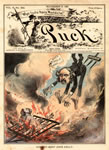
"Gone To Meet John Kelly," Puck, November 9, 1881
|
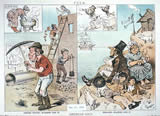
"American Gold," Puck, May 25, 1882 (anti-Irish), by Frederick Opper |
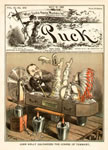
"John Kelly Galvanizes The Corpse of Tammany," Puck, May 31, 1882, by F. Graetz |
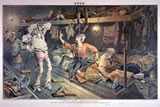
"Uncle Sam's Lodging House," Puck, June 7, 1882 (anti-Irish), by Joseph Keppler |
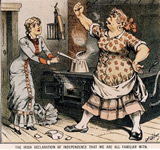
"The Irish Declaration of Independence That We Are All Familiar With," Puck, May 9, 1883 (anti-Irish), by Frederick Opper |
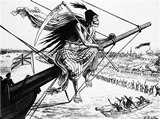
"The Kind of 'Assisted Emigrant' We Cannot Afford To Admit," Puck, July 18, 1883, by F. Graetz |
|
|
|
|
|
|

|
|
|
|
|
|
|
|
|
|

